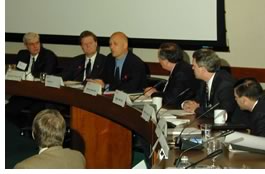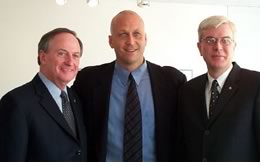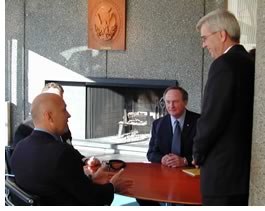
 At
the first meeting of the 2003 AIA Board of Directors, President Thompson
E. Penney, FAIA, announced that each Board meeting in the coming year
will begin with “a special presentation that will set an inspirational
tone for the meeting focused on the theme of that meeting to help us focus
on the opportunities that lie ahead.” Speaking on leadership at the
December 7 meeting was baseball legend Cal Ripken Jr. The presentation
was made possible through the generosity of MBNA America Bank.
At
the first meeting of the 2003 AIA Board of Directors, President Thompson
E. Penney, FAIA, announced that each Board meeting in the coming year
will begin with “a special presentation that will set an inspirational
tone for the meeting focused on the theme of that meeting to help us focus
on the opportunities that lie ahead.” Speaking on leadership at the
December 7 meeting was baseball legend Cal Ripken Jr. The presentation
was made possible through the generosity of MBNA America Bank.
Cal Ripken came up to the major leagues in 1981 and retired in 2001, playing his entire career with the Baltimore Orioles. In that time, he amassed statistics that will undoubtedly earn him a place at the Baseball Hall of Fame as soon as he is eligible. Most notably, in 1995, he broke Lou Gehrig’s record of 2,130 consecutive games played. Ripken’s record stands at a phenomenal 2,632 games played before he sat one out. He will next appear on television nationally as the grand marshal of the Fiesta Bowl Parade January 3, 2003, in Tempe, Ariz.
What did I learn from my 21 years of baseball that I could apply to a new career [as a motivational speaker, minor-league team and baseball-training-camp owner, and consultant to municipalities on ballpark design, among other things]? Those years have taught me the value of teamwork and of preparation. The basic things that go into baseball and athletics also apply in the real business world.
Motivation comes from the heart
I was part of a World Series championship team and I was part of a team
that started the season 0-21. And I think we learned the most from being
on a team that was 0-21. It was challenging to come to work and try to
do your job. So you really dig down and find out who you are as a person
by still trying to meet those challenges and doing the best you can.
 That
was a painful era. I think it’s easy when everything’s going
well. Everyone’s contributing. You feel like it’s easy to come
to work, and there are no real challenges—the tough part is how to
solve problems, how to get through the day, how to stay focused, be optimistic.
And all those things are challenged by failure. The whole country is looking
at us. ABC, CBS, and NBC are following us around for all the wrong reasons.
We did come together more as a team, however, and I think we started to
rely on each other more for support. Management is one thing, but in those
situations, you tend to look to your peers to help. You know innately
that you need to pull together in tough times and you need to work better
as a team to get through them. I made better friendships, I found out
a lot about myself and my teammates more by baring my soul a bit and saying,
“Let’s try to collectively solve the issue.”
That
was a painful era. I think it’s easy when everything’s going
well. Everyone’s contributing. You feel like it’s easy to come
to work, and there are no real challenges—the tough part is how to
solve problems, how to get through the day, how to stay focused, be optimistic.
And all those things are challenged by failure. The whole country is looking
at us. ABC, CBS, and NBC are following us around for all the wrong reasons.
We did come together more as a team, however, and I think we started to
rely on each other more for support. Management is one thing, but in those
situations, you tend to look to your peers to help. You know innately
that you need to pull together in tough times and you need to work better
as a team to get through them. I made better friendships, I found out
a lot about myself and my teammates more by baring my soul a bit and saying,
“Let’s try to collectively solve the issue.”
What I also learned is that there are a lot of things you can do on your own, and you have an individual responsibility to do those on the best level. Don’t close yourself to everybody else—open yourself up, share your ideas—somebody will come back with a different view and it will help you solve things and get through it. So we came back in a relatively short time and were competitive the very next year.
The pressure of being a role model
That was nice pressure. I think I was given more credit than I deserved
for bringing people back to baseball after the 1994 players’ strike. The
only pressure that I really felt in the buildup to my breaking Lou Gehrig’s
record was in the last week. I felt that everyone was celebrating an accomplishment
that hadn’t happened yet. So in that last week, I said “What if something
happens, and I can’t make it?” That was an added sense of responsibility.
But that was such a great experience, I didn’t really see it as a pressure-filled
scenario.
Fans don’t like to hear about the rich owners battling the rich players, basically to divide the rich pot, if I may oversimplify. The year before I broke the record, the World Series was cancelled, and we had a strike. There were bad feelings from the public, and I think all of us who love baseball were looking for something good to hold on to. People wanted a reminder of “the good old days.” And because my streak was breaking one of Lou Gehrig’s—an icon in baseball—it made a connection with people looking for something good in baseball. I became a recipient of that good feeling.
 When
I was a youngster watching baseball, Brooks Robinson was instrumental
in showing me how to handle that kind of attention. He was a model my
dad pointed me towards. He would do things right on the baseball field,
and he would do things right off the field. You really don’t understand
how important that is until you grow up a little bit. Fortunately for
me, I had a good role model and good parents to point that out to me.
As I got older in the game and my statistics began to come down a little
bit and the younger players came along, I thought my appeal to the younger
generation would fall off. But I found my popularity increased as I got
older because parents were pointing me out as a good example, just as
my parents did with Brooks Robinson.
When
I was a youngster watching baseball, Brooks Robinson was instrumental
in showing me how to handle that kind of attention. He was a model my
dad pointed me towards. He would do things right on the baseball field,
and he would do things right off the field. You really don’t understand
how important that is until you grow up a little bit. Fortunately for
me, I had a good role model and good parents to point that out to me.
As I got older in the game and my statistics began to come down a little
bit and the younger players came along, I thought my appeal to the younger
generation would fall off. But I found my popularity increased as I got
older because parents were pointing me out as a good example, just as
my parents did with Brooks Robinson.
Minimizing mistakes
As a fielder, you have a high percentage of control. As a hitter, you
can fail 70 percent of the time, and you’re considered great. So you have
to deal with a certain level of frustration. And to be successful, you
have to understand that there are going to be times when you’re slumping
as an individual and times when you’re slumping as a team. It’s how you
deal with those moments that are going to define your success overall.
If you can minimize your slumps, you can minimize your team’s slumps. You have to maintain your focus and composure so that you don’t turn a 6-game losing streak into a 12-game losing streak. A losing streak can sometimes define your success—or lack of it.
There’s nothing you can do about a mistake except learn from it. Try to take anything positive out of that experience that you can and try to keep your focus on what you’re trying to accomplish. It is emotional and mental, and the real power is within yourself. Physically, athletes are drilled over and over again to respond to certain situations, and they have certain genetic gifts. But the mental side of the game is how you stay strong in those areas and involves preparation. Each individual is different; you have to search and find a way that works for you.
I would step back and realize that the only way I can have success is if I could keep control of my emotions and stay calm in the heated moment of action. I convinced myself that if I still thought of something that happened yesterday or stopped to dwell on an error, things only get worse. So I let that go mentally and focus on things in front of me not behind me. Learn from it, but minimize those things behind you and you will minimize those slumps.
Preparation
Architects talk about scenario planning. Athletes have a similar strategy
of preparation. Mental preparation for potential situations allows you
to act instantly when the moment comes. Because baseball happens so fast
in the heat of the moment, if you haven’t given a lot of thought to what
might happen and run through all the hypotheticals in your mind, then
you have to think about the situation before you react, and you will miss
it. That was my expertise.
 It’s
that old thing in baseball. “What am I going to do with the ball
when it’s hit to me?” You look at the situation around you:
game score, who’s on base, what the speed is of the runner at the
plate, fast or slow field conditions. The dynamics change with each pitch
or runner. If you are “in the game,” it’s really amazing
that when something happens in front of 50,000 fans yelling in Yankee
Stadium in a big moment, that if you’ve done all your preparation,
when that ball comes to you, you know instinctively what to do, and it
just takes over. That is a way to look forward and not dwell on an error,
because if you do, you miss your planning time for the next moment.
It’s
that old thing in baseball. “What am I going to do with the ball
when it’s hit to me?” You look at the situation around you:
game score, who’s on base, what the speed is of the runner at the
plate, fast or slow field conditions. The dynamics change with each pitch
or runner. If you are “in the game,” it’s really amazing
that when something happens in front of 50,000 fans yelling in Yankee
Stadium in a big moment, that if you’ve done all your preparation,
when that ball comes to you, you know instinctively what to do, and it
just takes over. That is a way to look forward and not dwell on an error,
because if you do, you miss your planning time for the next moment.
Developing teammate talent
If you’re really helping someone, you’re not speaking to them as if they
are less talented than you were or from a lofty, condescending standpoint.
That gives you no results. You have to instill trust that you’re actually
trying help, not doing it for any other reason. Sometimes players would
help somebody and have some success. The press gets the word, and the
person who helped that player is singing the loudest in the paper: “Yeah,
I took him under my wing,” and all that. I always thought that created
a weird dynamic with that player, who is left wondering, “Did he
help me for me? Or did he help me for himself? Because he’s getting all
this attention for it.” And so I was always very careful about how
I presented my information.
From my experience and background, it was easy for me to explain to someone what they were doing and what they could do to improve. That’s a great power and a great responsibility. It can be very damaging if you don’t treat the other person correctly. I would always look for a moment where it was just me and him and would add just a little bit, not too much. And I would never take any credit for it. To give advice to someone, you have to have already built rapport so there is meaning to what you say. Normally, the best time you can help is when someone is really down or humbled, such as someone with an ego who realizes he can’t solve every problem. That’s when they’re more open for help.
And learning goes both ways. If you ever think that you’ve learned it all, then you stop learning. The young guys at the end of my career were still helping me understand the game from their perspectives. If you keep an open mind, you learn those things.
Leadership
I think we know inherently that leadership matters. But sometimes we lose
focus of what that is. The 2003 All Star game is a good example that leadership
matters. It ended in a tie. And, from the 19 All Star games I’ve been
in, I can tell you how that happened.
When you have talented people, you can’t just throw them into the room and hope everything comes out right. You have to have clear and consistent direction.
In the earlier years, the message from the All Star team manager was pretty simple. “Okay, this is an All Star game. But it matters. We’re going to try to win it, and I apologize to everyone in the room right now if I don’t get you in the lineup, but we’re going to try to win this game. This is a matchup between the best players in the American and National leagues. This is for bragging rights and for the fans.”
In the last six years or so, the message was changing to: “Okay, this is a once-in-a-lifetime opportunity for you guys. And I think the fans voted to put you here and they want to see you play. So I’m going to substitute freely and get everybody in the lineup. Some of you might not be here again, and I’m going to make sure that you enjoy this experience and you play.”
The leadership of the game should be the commissioner, and the message from the leadership has stopped. The two league presidents used to get the message from the commissioner above. The presidents would meet with their managers who would send the message to the All Star players. Absent leadership from the top, certain people take it upon themselves to invoke their own leadership. In this particular case, it was Joe Torre, who believes the All Star game is a showcase for baseball’s best in a laid-back leisurely kind of manner. “Yeah, we’re going to try to win, and you guys are professional athletes and you’ll go out and play hard and try to win, because that’s what you do. But I’m going to try to make sure that we get you in there.”
Having Joe being there six out of eight years meant his philosophy started to take over. Now Bob Brenly was a new manager. He won the World Series for the Diamondbacks but he’d never managed an All Star team before. So what does he do? He goes and talks to Joe Torre, who tells Bob his philosophy. And so they were both substituting very freely. Once you take a pitcher out, he can’t go back in. So they actually ran out of pitchers and had to end the game in a tie. That’s an example where the lack of a philosophy at the top ended up in controversy.
Copyright 2002 The American Institute of Architects. All rights reserved.
![]()
|
For more information on Cal Ripken Jr., visit the Ripken Baseball Web site. |
|
